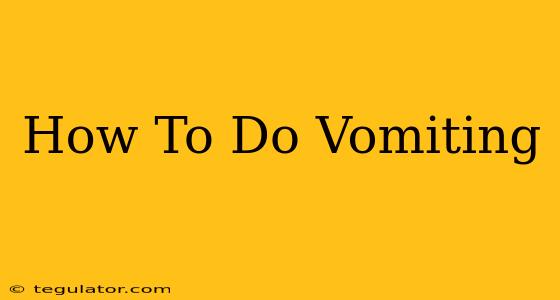Disclaimer: This information is for educational purposes only and should not be considered medical advice. Never induce vomiting without consulting a medical professional. There are serious risks associated with inducing vomiting, and it's crucial to seek appropriate medical care when necessary. Incorrectly inducing vomiting can be dangerous and even life-threatening.
When to Consider Inducing Vomiting (Under Strict Medical Supervision)
Vomiting is your body's way of ridding itself of harmful substances. While it's generally best to let the body handle this naturally, there are extremely limited circumstances where a doctor might recommend inducing vomiting, usually within a very short window after ingestion of a specific poison. This decision is entirely up to the physician and based on the specific circumstances and the substance ingested.
Some instances where this might be considered (again, only under strict medical supervision) include:
- Certain poisonings: A doctor might recommend inducing vomiting for some types of poison ingestion, but only if they deem it safe and appropriate.
- Medication overdose (rare): In very specific cases of medication overdose, a doctor may recommend induced vomiting, though other methods are usually preferred.
It is crucial to understand that in most cases of poisoning or overdose, inducing vomiting is NOT recommended. Other, safer methods like activated charcoal or other medical interventions are usually preferred.
Methods to Induce Vomiting (Only Under Medical Guidance)
Again, DO NOT attempt to induce vomiting without explicit instructions from a medical professional. The risks outweigh any potential benefits.
If a doctor deems it medically necessary to induce vomiting, they might use one or more of these methods:
- Ipecac syrup (generally not recommended anymore): Ipecac syrup was once commonly used, but is now largely discouraged due to its potential side effects and limited effectiveness.
- Gastric lavage (stomach pumping): This is a medical procedure where a tube is inserted through the nose or mouth into the stomach to remove the contents. This is performed by a medical professional in a controlled setting.
- Activated Charcoal: This is often preferred over inducing vomiting, as it binds to the poison and helps to prevent its absorption.
When NOT to Induce Vomiting
There are many situations where inducing vomiting is strongly contraindicated and could be extremely harmful. These include, but aren't limited to:
- Ingestion of corrosive substances: Acids or alkalis can cause further damage to the esophagus if vomiting is induced.
- Loss of consciousness: Inducing vomiting in an unconscious person is extremely dangerous.
- Ingestion of petroleum products (gasoline, kerosene): These can cause aspiration pneumonia, a life-threatening condition.
- Seizures: Inducing vomiting during a seizure can be fatal.
Seeking Immediate Medical Attention
If you or someone you know has ingested a poisonous substance or overdosed on medication, immediately call emergency medical services. Do not attempt to treat the situation yourself. Time is crucial in these situations. Provide as much information as possible to the emergency responders, such as the substance ingested, the amount, and the time of ingestion.
Remember: This article is purely for informational purposes. Always seek professional medical advice in case of any medical emergency. Do not attempt to induce vomiting unless explicitly instructed to do so by a qualified medical professional. The risks associated with self-induced vomiting significantly outweigh any potential benefits.

